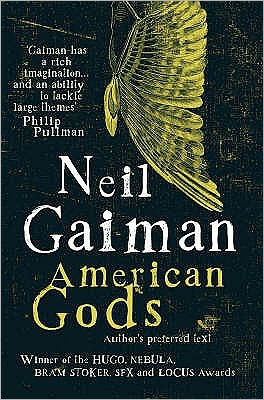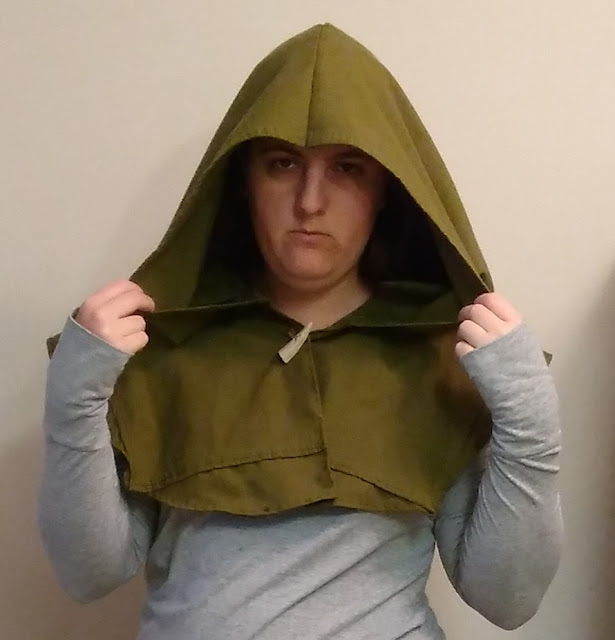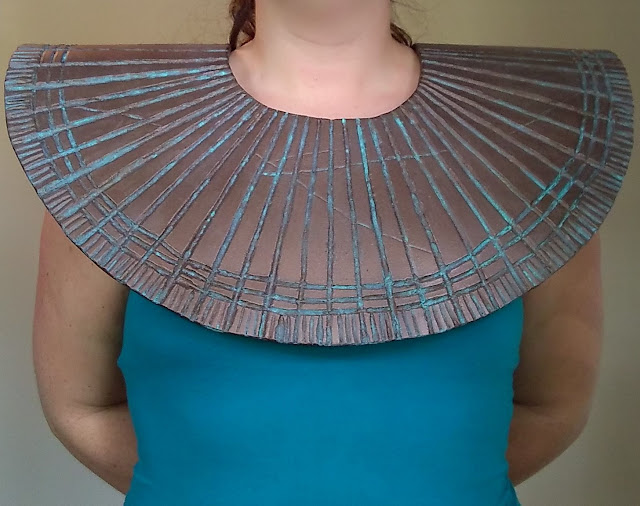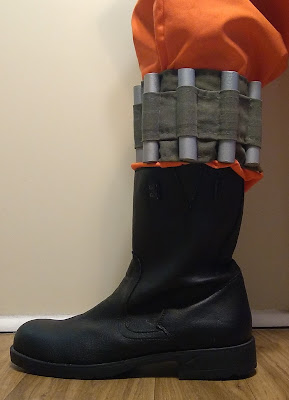Starbat's Favorite Urban Fantasy Books
Time for some more urban fantasy books, huzzah!
1. American Gods (Neil Gaiman)
If you write an urban fantasy book list without including any Neil Gaiman, have you really written an urban fantasy list? Well, yeah, sure, but it's way harder not to include any Gaiman. Gritty urban noir with a side of magic and mayhem is kind of his main wheelhouse. Of the Gaiman works I've read (a smattering, though certainly not all of them), my favorite remains American Gods. It is perhaps the best story about gods being diminished through loss of faith or rebellion that I have read/seen (and I've read/seen a lot, it's one of my favorite themes, from Wrath of the Titans and Percy Jackson to Scar Night and His Dark Materials). In the story, recent widower Shadow ends up working for a modern version of Odin as a war between the old gods (including Odin and his friends Anansi, Thoth, etc) and the new god-like representations of pop culture, the internet, and globalization. As a kid, I spent every summer with my family road-tripping around the US, taking back roads, staying in crappy motels, and visiting weird landmarks. As such, the journey American Gods takes around the US, imbuing the same kind of roads I took as a kid with so much depth and power and crushing history, is particularly chilling.
2. The Devil You Know (Mike Carey)
This is a new book for me (with sequels! I can't wait), but I have to say that I really enjoyed it. As with many urban fantasy novels, the world of the story is just slightly removed from our normal reality. In the storyworld, ten years have passed since the dead began to rise. Life continues largely as normal, except that spirits pop up frequently, along with occasional zombies, demons, and other creatures of the night. Unlike many urban fantasy novels, the world changes (the risen dead) are common knowledge to the world, as opposed to being hidden. As a result, the main character is a shady exorcist who acts something like an exterminator by taking a job to banish a spirit that is haunting a local government building. As one would expect, the job is nowhere near as simple as it sounds, and horror, action, and intrigue follow. The book is basically a classic private eye noir story, starring a character that can really only be called John Constantine. I mean, really, he's a tragic occult detective with a dark past and a trench coat (sorry, a Russian paletot), written by a guy who used to write Hellblazer. Not that I'm complaining, I like Constantine and this is a great book. But, you know. It's pretty ballsy.
3. A Madness of Angels (Kate Griffin)
This is legitimately one of favorite books of all time, and its depiction of urban magic is utterly gorgeous in a Charles de Lint kind of way. The book follows a newly resurrected Matthew Swift, an urban sorcerer powered by the surge of 5 o'clock traffic and the flare of neon signs at night, as he attempts to retrace his last steps and track down his killer, as well as his attempts to untangle or even quantify his strange relationship to the entity know as the Electric Blue Angels. This is a book that truly embraces the idea of urban sorcery, where the power and limits of city-dwelling magic users are defined by the belief and actions of everyday citizens. Dragons are made of road signs, wards are drawn in spray paint using traffic symbols, and the Bag Lady and the Rat King are semi-mortal deities. It is a truly beautiful book, and I would encourage anyone interested in urban fantasy to dive into this book and its wonderful sequels.
4. The Warrior Heir (Cinda Williams Chima)
The Warrior Heir is, in general, a classic coming-of-age urban fantasy novel from 2007. What sets it apart is a more interesting magic system than "hiss hiss, I'm a vampire." Which appeals to me. The book follows Jack, a teen who learns of his own mystical warrior powers (which sounds stupid, but bear with me), and is almost immediately thrown into a hidden magical subculture where political intrigue is frequently a deadly art. In this particular system, there are five major types of magic users, each with different skills. However, the main conflict comes from the fact that one guild, the wizards, has subjugated the other guilds (not to mention what they think of non-magic-users) for centuries, a system that our protagonist is bent on upending. This book has two sequels, each expanding the universe by following a new protagonist, but The Warrior Heir remains my favorite.
5. The Serpent's Shadow (Mercedes Lackey)
Okay, so this is actually a period piece set in 1909, but bear with me. Usually I limit my idea of urban fantasy to modern period settings, but urban fantasy is most importantly (to me) the introduction of a magic system into a recognizable post-Industrial Revolution setting (because I think that the interplay of magic and technology is one of the most interesting hallmarks of urban fantasy). Anyways, Mercedes Lackey has a whole series of novels set in this early 1900s setting dealing with a system of magic based on magicians with specific elemental foci (in general, each magic-user has an inborn connection to a specific element- using the standard Western fire/earth/water/air canon of elements). This is my favorite book in the series, perhaps because it deals with feminism and racism in early 20th century England, while also being an awesome story about magic and myth set in the Edwardian era. The protagonist is a badass half-English, half-Indian, lady doctor, and if that doesn't make you want to read the book, I have nothing else to offer you.
1. American Gods (Neil Gaiman)
If you write an urban fantasy book list without including any Neil Gaiman, have you really written an urban fantasy list? Well, yeah, sure, but it's way harder not to include any Gaiman. Gritty urban noir with a side of magic and mayhem is kind of his main wheelhouse. Of the Gaiman works I've read (a smattering, though certainly not all of them), my favorite remains American Gods. It is perhaps the best story about gods being diminished through loss of faith or rebellion that I have read/seen (and I've read/seen a lot, it's one of my favorite themes, from Wrath of the Titans and Percy Jackson to Scar Night and His Dark Materials). In the story, recent widower Shadow ends up working for a modern version of Odin as a war between the old gods (including Odin and his friends Anansi, Thoth, etc) and the new god-like representations of pop culture, the internet, and globalization. As a kid, I spent every summer with my family road-tripping around the US, taking back roads, staying in crappy motels, and visiting weird landmarks. As such, the journey American Gods takes around the US, imbuing the same kind of roads I took as a kid with so much depth and power and crushing history, is particularly chilling.
2. The Devil You Know (Mike Carey)
This is a new book for me (with sequels! I can't wait), but I have to say that I really enjoyed it. As with many urban fantasy novels, the world of the story is just slightly removed from our normal reality. In the storyworld, ten years have passed since the dead began to rise. Life continues largely as normal, except that spirits pop up frequently, along with occasional zombies, demons, and other creatures of the night. Unlike many urban fantasy novels, the world changes (the risen dead) are common knowledge to the world, as opposed to being hidden. As a result, the main character is a shady exorcist who acts something like an exterminator by taking a job to banish a spirit that is haunting a local government building. As one would expect, the job is nowhere near as simple as it sounds, and horror, action, and intrigue follow. The book is basically a classic private eye noir story, starring a character that can really only be called John Constantine. I mean, really, he's a tragic occult detective with a dark past and a trench coat (sorry, a Russian paletot), written by a guy who used to write Hellblazer. Not that I'm complaining, I like Constantine and this is a great book. But, you know. It's pretty ballsy.
3. A Madness of Angels (Kate Griffin)
This is legitimately one of favorite books of all time, and its depiction of urban magic is utterly gorgeous in a Charles de Lint kind of way. The book follows a newly resurrected Matthew Swift, an urban sorcerer powered by the surge of 5 o'clock traffic and the flare of neon signs at night, as he attempts to retrace his last steps and track down his killer, as well as his attempts to untangle or even quantify his strange relationship to the entity know as the Electric Blue Angels. This is a book that truly embraces the idea of urban sorcery, where the power and limits of city-dwelling magic users are defined by the belief and actions of everyday citizens. Dragons are made of road signs, wards are drawn in spray paint using traffic symbols, and the Bag Lady and the Rat King are semi-mortal deities. It is a truly beautiful book, and I would encourage anyone interested in urban fantasy to dive into this book and its wonderful sequels.
4. The Warrior Heir (Cinda Williams Chima)
The Warrior Heir is, in general, a classic coming-of-age urban fantasy novel from 2007. What sets it apart is a more interesting magic system than "hiss hiss, I'm a vampire." Which appeals to me. The book follows Jack, a teen who learns of his own mystical warrior powers (which sounds stupid, but bear with me), and is almost immediately thrown into a hidden magical subculture where political intrigue is frequently a deadly art. In this particular system, there are five major types of magic users, each with different skills. However, the main conflict comes from the fact that one guild, the wizards, has subjugated the other guilds (not to mention what they think of non-magic-users) for centuries, a system that our protagonist is bent on upending. This book has two sequels, each expanding the universe by following a new protagonist, but The Warrior Heir remains my favorite.
5. The Serpent's Shadow (Mercedes Lackey)
Okay, so this is actually a period piece set in 1909, but bear with me. Usually I limit my idea of urban fantasy to modern period settings, but urban fantasy is most importantly (to me) the introduction of a magic system into a recognizable post-Industrial Revolution setting (because I think that the interplay of magic and technology is one of the most interesting hallmarks of urban fantasy). Anyways, Mercedes Lackey has a whole series of novels set in this early 1900s setting dealing with a system of magic based on magicians with specific elemental foci (in general, each magic-user has an inborn connection to a specific element- using the standard Western fire/earth/water/air canon of elements). This is my favorite book in the series, perhaps because it deals with feminism and racism in early 20th century England, while also being an awesome story about magic and myth set in the Edwardian era. The protagonist is a badass half-English, half-Indian, lady doctor, and if that doesn't make you want to read the book, I have nothing else to offer you.








Comments
Post a Comment